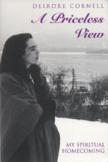River+Mountains+Gospel Living
Reading a work by someone you’ve met and whose life and ministry you admirethat inevitably counts as a factor when you sit down to review the person’s first book. Happily and objectively, I can recommend Deirdre Cornell’s A Priceless View: My Spiritual Homecoming to all who find prayerful sustenance in autobiographies by Gospel-centered people.
I met Deirdre after visiting her parents at a Catholic Worker farm in Marlboro, N.Y. She and her husband and their three young children currently live not there, but in the nearby city of Newburgh, on the banks of the Hudson River. And Newburgh, a depressed city with a long history of ups and downs, lies at the heart of A Priceless View: My Spiritual Homecoming. So does the Hudson; but why homecoming in the subtitle? Because after spending her childhood in Newburgh, her parents temporarily moved the family to another state. Only as an adult did she return with her husband, Kenney, and their small children. Kenney’s own background, like hers, had Catholic Worker roots. He had worked at the Catholic Worker in Los Angeles as a teenager.
The return to Newburgh was marked by both light and shadow. The light stemmed largely from the author’s again being in the presence of the beloved river and its nearby mountains, which provide the priceless view. The shadow part of the homecoming came with meeting once-close childhood friends whose promise had been slowed, if not cut off, by poverty, too-early pregnancies, AIDS and violence. She herself had once been beaten up by a gang of girls, when she trespassed on a street they claimed as their turf. Her childhood neighborhood was culturally mixedAfrican American, Hispanic and white. And it was in experiencing this mixture that Deirdre learned the solidarity of neighborlinessas well as the race and class distinctions that undercut it.
Her own upbringing, like that of her neighbors, could be classified as economically poor. But hers was a benign form of poverty, one that involved a deliberately simple lifestyle. Such a lifestyle is in her blood. Her parents met, she tells us, in New York City over a soup pot at the Catholic Worker on the Lower East Side, where both were live-in volunteers. Her father worked for a time as managing editor of the movement’s newspaper, and Deirdre remembers visits to see Dorothy Day. Although her family lacked a secure income, the necessities were always there, as well as a loving family atmosphere imbued with the spiritual values epitomized in Matthew 25.
A solid parochial school education in Newburgh eventually led to college and then to graduate school. Deirdre holds a master’s degree in theology from the Jesuit School of Theology in Berkeley, Calif., and her theological background is reflected in frequent quotations from the Psalms, a section of the Bible that she, like Dorothy Day, clearly loves. She introduces one section of her book that deals with migrants, for instance, with lines from Ps. 28, like O Save your people...carry them forever.
Migrants are indeed in need of God’s saving power, in the sense of having their dignity and their rights respectedrights often trampled upon in the post 9/11 world. They make up a significant portion of Newburgh’s population, working in the area’s apple orchards and cornfields, as well as in local factories. Deirdre and her husband have rented their upstairs apartment to various migrant families, and Kenney’s full-time job is at a migrants’ clinic that provides care for migrant workers. Both help arrange the Spanish-language liturgies there and kneel side by side on the hard, severe concrete floor of the clinic as the consecrated host is raised. Although she is a strong feminist who takes issue with some of the church’s positions, Deirdre nevertheless feels close to it; and once the children began arriving, she started attending Mass daily at her local parish in Newburgh. Fluent in Spanish, both she and Kenney have been teaching catechism there to Latino youngsters.
For all her love of Newburgh, howeverits people, its history, the river and the mountainsshe nevertheless tells us at the book’s end that her presence in Newburgh is not permanent. Sooner or later, she writes, on a valedictory note, I will leave. The path that brought me back here, she continues, is the same one that will someday take me away...[because] we have many landscapes to explore...other rivers and other mountains.
But at some point in the future, she and her family may experience yet another spiritual homecoming to Newburgh and its people, framed by the priceless view it offers. In any event, gifted young writer that she is, Deirdre Cornell is one whom we can look forward to hearing from again in the years ahead.
This article also appeared in print, under the headline “River+Mountains+Gospel Living,” in the September 20, 2004, issue.








